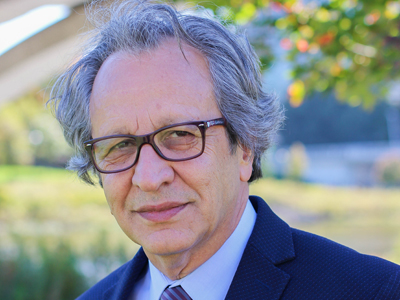AI Policy Expert Discusses Changing Regulatory Landscape
The landscape of AI regulation in the United States is undergoing significant changes, with President Donald Trump announcing a major new infrastructure investment and rescinding an existing executive order by former President Joe Biden focused on AI development.
Hamid Ekbia is director of the Autonomous Systems Policy Institute at Syracuse University and founding director of the Academic Alliance for AI Policy. He took time to answer a few questions about the current state of AI regulation.
Q: How do government regulations shape AI development?
A: The federal government has a decisive role in creating the environment in which different players in the AI space operate. This could happen through regulation or in the absence of regulation. In the past, when the federal government was inclined to regulate technology through executive orders (and this included both the first Trump and Biden administrations), companies indicated interest in getting some measure of guidance from the government in establishing guardrails around AI technology in the hope of establishing an even playing field of transparent and ethical AI.
The rescinding of Biden’s executive order is going to unravel the minimal steps taken to regulate AI in the U.S., dampening the momentum that was being built in places such as the National Institute of Standards and Technology, and putting us behind others, especially the European Union, in this space. This will exacerbate current gaps in regulation even further, putting control in the hands of a small number of big corporations who have shown the ineffectiveness of self-regulation again and again.
The change of direction by Meta is a good example of this. In his testimony to the Senate in September 2023, Mark Zuckerberg, among other executives, endorsed AI regulation. In the last few weeks, in anticipation of the changing administration, Facebook changed course, replacing the internal mechanism for fact-checking, leaving the door open for the spread of even more misinformation to the society. This is just the beginning of a decline in transparency and accountability, the deeper impacts of which we will see down the road.
Practices such as patent shelving clearly show that companies cannot be trusted to prioritize innovation on their own; a regulated environment is much more conducive to innovation than an unregulated market.
Hamid Ekbia, Autonomous Systems Policy Institute Director
Q: Could rescinding the order help spark innovation, as some companies have argued?
A: The idea that less regulation leads to more innovation is a myth propagated by major corporations who currently have a monopolistic position in the AI space. History has shown that these corporations use their position not to expand innovation but to dampen and suppress it in all kinds of ways.
A primary example of this is patent shelving, where big corporations buy out innovations by small players or startups, not to implement the innovation but to protect their own monopolistic position in the market. There are numerous examples of this — for instance, when Google bought Motorola Mobility in 2012 just to shelve a large portion of the 17,000 patents that were included in the purchase.
Practices such as patent shelving clearly show that companies cannot be trusted to prioritize innovation on their own; a regulated environment is much more conducive to innovation than an unregulated market.
Q: The European Union has imposed stricter regulations on AI than the U.S. What might that mean for the companies behind this technology?
A: The key issue is the regulatory gap that corporations have to navigate between the U.S. and the E.U. Big corporations will each find a way of dealing with this gap by complying differently with different requirements in the two contexts. But whatever they do, the American public will get the shorter end of the bargain in terms of the safety, privacy, trustworthiness, and perhaps even financial cost of technology.
To request interviews or get more information:
Chris Munoz
Media Relations Specialist
cjmunoz@syr.edu



